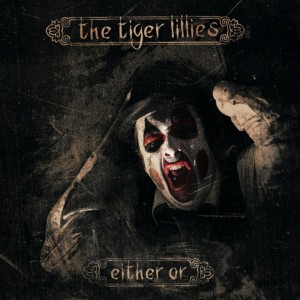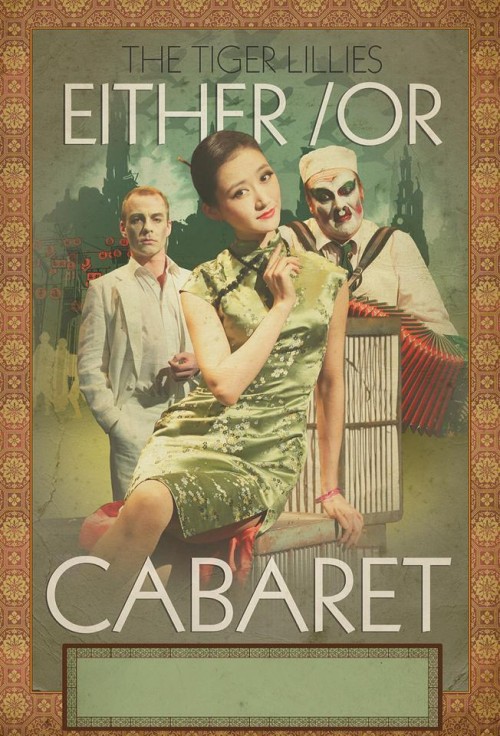 What do the macabre champions of gypsy cabaret and a 19th century existential poet/ philosopher/ theologian have in common? A nagging existential angst? Maybe. Or is it that The Tiger Lillies’ new album, Either Or, is titled after and inspired by Soren Kierkegaard’s famous eponymous book? The record works two-fold: first to explore the themes and musings from the Dutch philosopher, and second to create a story serving as the libretto for the subsequent stage show about a shady Shanghai nightclub circa 1937.
What do the macabre champions of gypsy cabaret and a 19th century existential poet/ philosopher/ theologian have in common? A nagging existential angst? Maybe. Or is it that The Tiger Lillies’ new album, Either Or, is titled after and inspired by Soren Kierkegaard’s famous eponymous book? The record works two-fold: first to explore the themes and musings from the Dutch philosopher, and second to create a story serving as the libretto for the subsequent stage show about a shady Shanghai nightclub circa 1937.
Either Or begins with the cheeky, almost fun “Blood Alley.” It comes across like Vaudevillian hip-hop – or possibly the theme song to a wildly inappropriate children’s show – with its lilted backbeat and catchy singsong narrative about the urban underbelly. This may be the “funnest” song in the lot – a slight departure for The Lillies – as the rest of the album plays out somber, heavy and dark. It also sets the scene for THE EITHER/OR CABARET:
“THE EITHER/OR CABARET takes place in a nightclub in Shanghai in 1937, where Chinese and Europeans live their dreams. Outside the city swarms with enemies. Should the nightclub patrons stay or flee?”
This brief description of the play is an existential parable in itself. Stay and enjoy the comfort of vice at your own risk or bravely break away and build a new life?
“BLOOD ALLEY”
Kierkegaard’s perspective is woven into the story instantly by exploring the perils of hedonism and relaying morality tales in a series of anecdotal songs. Either/Or, as its original written work, explores the Aesthete vs. the Ethicist or the pursuit of pleasure vs. a pursuit of morality and altruism. Songs like “Nothing is Sin” and “Gutter” are pure, sick Tiger Lillies embrace of the dark and seedy. “The lowest things normal are / You’re giving blowjobs in their cars / In their cars / You take it all / You smile and laugh / As they stick it up your ass / Up your ass.” From this perspective, the album seems to focus on Kierkegaard’s Either more so than the Or as it underscores the aesthetic or pursuit of instant gratification.
Other songs investigate broader themes of the Dutch philosopher. The brooding piano ballad, “Boredom” speaks to the assertion that being bored is the genesis of evildoing. Kierkegaard noted, “Boredom is the root of all evil – the despairing refusal to be oneself.” Martyn Jacques of the Lillies sings, “I would be happy, but need a thrill / Give me a whore, give me a pill / Give me a war for which to fight / Give me a bank to rob tonight / From boredom each evil thought is formed / Boredom, the devil’s spawn.”
“Innocence” addresses the flipside of boredom as a young, drug-addled prostitute dreams of another life, bored from the pleasures of sin: “Sometimes as they stick it in / I get bored from all this sin.” This dark, fragile story is followed immediately by “Sailor,” sung from the trick or john’s perspective; “She licks my cock / It’s kind of sad / As an actress / I suppose she’s bad / She’s done it all / 10 times before / And that is only / Today I’m sure.”
Musically, the album has all the marks of the Tiger Lillies with Adrian Stout’s clean, punchy stand-up bass and tricks with his bow, clever percussion (sans Adrian Huge this time), and the addition of multi-instrumentalist, David Coulter (The Pogues, Radiohead, Tom Waits) who helps create atmospherics with banjo, uke and violin, nose flute, jew’s saw, weeping saws, maracas, ominchord and clackamore. Then there is Martyn Jacques‘ cockney falsettos and growls accompanied by harmonium, piano, and his trademark accordion. An insidious accordion, recognized as traditional and innocuous, lures the listener by legitimizing the music and softening the blow of the content.
TTL again manage to take lofty themes from the humanities, turn them inside out so their guts show, creating dark and clever theater with their unique musical interpretations as the backbone. It might be hard to associate the works of a theologian like Soren Kierkegaard with such a graphic and disreputable tale (especially with lines like “Fuck God up in heaven/ He isn’t all there/ He’s just an imposter / Behind beard and hair”), but it’s the examination of the “aesthetic” in human existence and ultimately, the awakening of the spirit to rescue the “single individual” from this life (or not) that plays with Kierkegaard’s themes.
A musical journey using the backdrop of a seedy Chinese opium den – and the twisted, dark souls that inhabit it as the characters – to delve into the themes of a 19th century philosopher / poet is pure Tiger Lillies. The release of the album and debut of the show coincide with the bicentennial celebration of Kierkegaard’s birth. The show will be playing in Shanghai, but luckily the album is available everywhere.
BUY EITHER/ OR from THE TIGER LILLIES on iTunes or at THEIR WEBSITE
RELATED STORIES:
Happy Halloween! An Interview with Martyn Jacques of the Tiger Lillies

